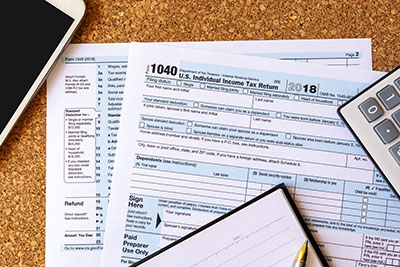How to reduce the tax bite on your retirement income
The impact of taxes on your retirement income can be uncertain, but there are ways to minimize the bite they take out

Ben Franklin famously said that the only certainties in life are death and taxes. But the impact of taxes – especially on your retirement income – is far from certain. Some investments and retirement funds are taxed in retirement, some aren’t, and about others you can only say: “it depends.”
Many people think about how contributing to certain retirement accounts, such as a 401 (k) or traditional IRA, can reduce their tax burden while they work.1 But that’s only the first step in thinking about taxes and your retirement. If you’re still working, are there ways to refine your tax and investment strategy now so you have more income available to you after you retire? And if you’re already retired, what can you still do to minimize your tax payments in retirement and maximize your income?
Some current and future retirees might think that the money they take out of their pension accounts after they retire is tax free or “tax lite,” but that’s not necessarily true. It depends in part on the type of accounts in which they’re held and whether you paid taxes on the income you used as retirement contributions when you first earned the money.
The taxes you will pay (or are paying) on your withdrawals from retirement accounts also depend in part on your total annual income as a retiree. Retirees typically have fewer potential tax credits and deductions (e.g., no child credits or business expenses), which keep their tax rates high. On the other hand, they generally don’t need to take more money from retirement accounts than they will actually use in a given year, which can reduce their tax rates – particularly if they live in a modest retirement lifestyle.
Here's a look at some of the most popular retirement accounts and pension plans, their tax implications – and what you can do to minimize taxes on withdrawals:
401 (k)s and other pre-tax plans – As we mentioned above, contributions to these plans while you work can reduce your taxes in the years in which you make the contributions. But there’s always a piper to pay, and he comes calling with a tax bill at your regular income tax rate when you make retirement withdrawals on funds for which you didn’t previously pay taxes. If your plan administrator withholds taxes from your distributions, consult the administrator to confirm that the withholding is enough to cover your tax bracket.2
Traditional IRAs – The distributions you take from a traditional IRA after you retire are generally subject to tax, because you likely didn’t pay tax on the contributions when they were made. The distributions you take from a traditional IRA after you retire are generally subject to tax, because you likely didn’t pay tax on the contributions when they were made. But these withdrawals may be taxed only partly or not at all if you did pay taxes on the contributions.3
Roth IRAs – The distributions you take from a Roth IRA are tax-free, because (by law) you paid taxes on the income you used as contributions to that plan while you were working. That makes these distributions especially valuable to you as a retiree. Your Roth IRA should be one of the first sources of funds you tap in retirement, while your taxable accounts can generate continuing returns in the background.
What you can do to minimize taxes in retirement:
Convert! If you’re already invested in a traditional 401(k) or IRA and you’d like to gain the tax-free retirement benefits of Roth distributions, you can convert your current plans. Note that you’ll have to pay taxes on converted funds in the year you make the conversion, hold the converted account for at least five years, and take your distributions on or after you’re 59 ½. Your financial planning professional can help you identify the relative costs and benefits to you.4
Get ready for minimum distributions. Generally, you can’t withdraw funds from retirement accounts before age 59 ½ without incurring a penalty. But keep in mind that you must make minimum withdrawals from most plans by the year you turn 73*, or you can be penalized for half the amount you should have withdrawn. When feasible, try to avoid withdrawing so much money in any one year that you raise your tax bracket.5
Consider taking out the tax-free money first. It's generally a good idea to diversify the types of accounts you maintain for retirement, including both taxable and non-taxable accounts. One way to reduce your total tax burden in retirement may be to withdraw money first from non-taxable accounts, such as Roth IRAs. That makes it possible for your taxable 401(k) money to continue to grow before the government gets its share.
Move! There’s a reason so many retirees move to Florida – a state with no income tax – each year. Tax policy varies by state, which makes where you choose to live an important part of your retirement planning.
All this is only part of what you need to keep in mind as you plan for a low-taxed retirement. There’s also the potential tax bite into your Social Security payments and any post-retirement wages or salary you continue to earn. Also, consider learning about special tax breaks for retirees. Your financial planning professional can be a vital resource in helping you to make the most of your retirement funds.
*The SECURE 2.0 Act changed the required beginning date for RMDs to age 73 for individuals attaining age 72 after December 31, 2022, and age 73 before January 1, 2033. Custodians are awaiting clarification, but SECURE 2.0 also appears to indicate that the required beginning date for Required Minimum Distributions (RMD) age is pushed back to 75 effective after December 31, 2032.
